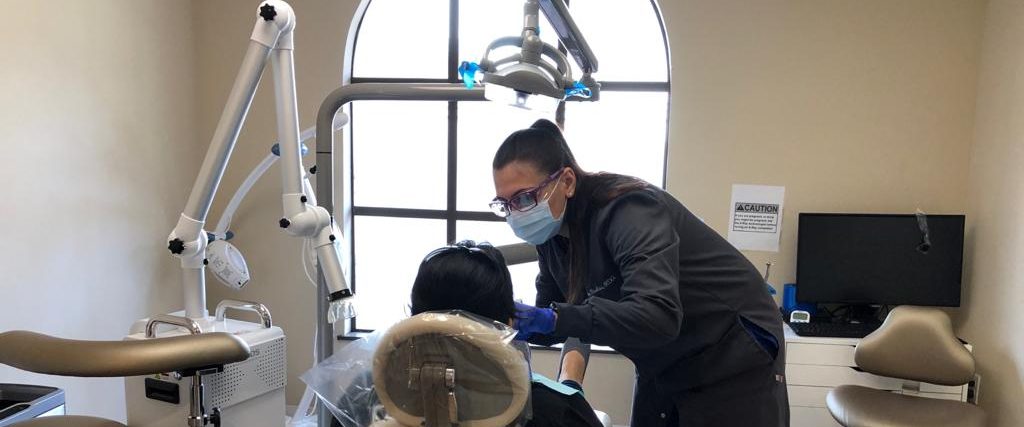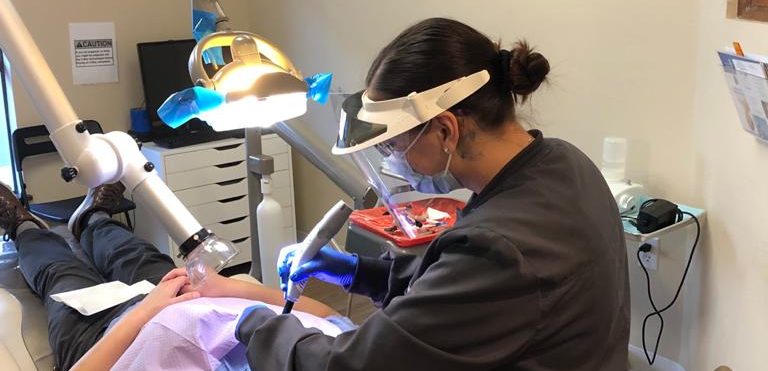Date : 07/09/2020
We’re going to tell you something that might catch you by surprise. Your mouth is full of oral bacteria.
The truth is, living our everyday lives, we don’t know they are there because we can’t see them or taste them. But scientists have identified more than 700 different strains of oral bacteria.
Don’t freak out, it’s not bad news — necessarily.
In fact, most people only have a few dozen different varieties in their mouths. And the majority of these bacteria are harmless. And some are even helpful.
But the ones that aren’t helpful? Those are the ones you need to watch.
Oral Bacteria and Cavities
Every person on the planet has their own personalized microbiome in their mouths. These microbiomes include the live bacteria that live in your mouth and is as unique as you are. And they have jobs.
These bacteria feed off of the sugars and starches that are left behind when we eat. The waste products these bacteria create makes a biofilm that forms dental plaque. And the acids made by this process eventually wear down the enamel of your teeth and cause cavities.
Out of control oral bacteria cause gum disease, gingivitis, and periodontitis, which leave your gums red and inflamed.
But not only that: These conditions can lead to infected gums and even bone loss. A telltale sign is that your gums become sensitive and may bleed while you are brushing your teeth.
You might think to yourself: “Well, it’s only my mouth. It’ll be fine.” The only trouble is, out of control oral bacteria doesn’t only cause problems in your mouth.
What you’re looking for
Not that you can see them, but when we’re talking about harmful oral bacteria, we’re really addressing two major culprits: Streptococcus mutans and porphyromonas gingivalis.
Streptococcus mutans is the oral bacteria that live in your mouth and feed on the sugars and starches that you eat. Like we mentioned above.
That’s all well and good. In fact, we need that. But those little monsters don’t want to stop there. Oh no, they want your enamel too. If you let their acid by-products eat your enamel, your teeth become damaged. And that’s where brushing, flossing, and rinsing come in.
Now, porphyromonas gingivalis is a different story. This bacteria can’t usually live in a healthy mouth. So, if it does live there, chances are your mouth is already on the downturn and needs help. When this particular bacteria grows in your mouth, it’s usually because you’ve developed periodontitis.
Periodontitis is a gum infection serious enough that it destroys the bone supporting your teeth and also the surrounding soft tissue. Left untreated, this disease will leave you without any teeth at all.
Oral Bacteria Affects More than You Think
You might have already known that you have bacteria in your mouth. You may also know that you have bacteria living all over your body inside and out. But that’s not the end of the story. The bacteria that live in your mouth don’t just affect your mouth. They have an impact on the health of your whole body.
Some of the impact is good. For example, some bacteria found in the human mouth are also probiotics, which aid in proper digestion. But, some bacteria can have negative effects.
1. Alzheimer’s
A study conducted by researchers at the University of Central Lancashire (UCLan) School of Medicine and Dentistry in England looked at the brain tissue of 20 patients. Half of these patients had dementia, and the other 10 did not. When examining the donated tissue, researchers found gum disease bacteria in four of the people with dementia. In those patients without dementia, they had no gum disease and no signs of the bacteria found in dementia patients.
You might be wondering how oral bacteria can get to the brain. Here’s how:
When you chew food or brush your teeth, the bacteria from your mouth can enter the bloodstream. Once it’s in the bloodstream, it can travel anywhere in the body. In this case, it’s theorized that the bacteria traveled to the brain and caused an immune response which altered the brain.
Dr. Crean, who was involved with the study, stated:
“This new research indicates a possible association between gum disease and individuals who may be susceptible to developing Alzheimer’s disease if exposed to the appropriate trigger.
Research currently underway at UCLan is playing an active role in exploring this link, but it remains to be proven whether poor dental hygiene can lead to dementia in healthy people, which obviously could have significant implications for the population as a whole. It is also likely that these bacteria could make the existing disease condition worse.”
Granted, the study only involved 20 people, which in the grand scheme of things is minuscule, but the study raises a link question. Further study needs to happen, and it’s something to keep in mind.
2. Heart disease
Similar to the bacteria in the bloodstream possibly leading to Alzheimer’s, this bacteria can cause other problems as well. One of those problems is heart disease.
There are several different bacteria that cause periodontitis, which we alluded to above. Researchers have found a link between some of those bacteria and the atherosclerotic plaque in the arteries throughout the body, including the heart. And we all know how plaque affects arteries, don’t we? They dam up the arteries and prevent blood from going where it needs to go, leading to possible heart attacks and strokes.
Even though it’s difficult to directly link any oral bacteria in the mouth to problems in other parts of the body, you should still take care of your teeth. In other words, don’t take chances. While the scientists continue their research, you can do your heart and the rest of your body a favor by taking care of your oral health.
3. High blood pressure
Researchers linked the presence of oral bacteria and gum diseases to high blood pressure. Studies have found that patients with severe periodontitis (oral infections) also have hypertension. According to studies, higher levels of oral bacteria correlate with increases in both systolic and diastolic blood pressure, indicating a direct relationship between periodontitis and hypertension.
But it’s a chicken/egg situation. It’s unknown at this point whether periodontal infections cause hypertension or vice versa. In any case, it seems the two are linked, and more research is necessary.
Dr. Joan Otomo-Corgel, president of the American Academy of Periodontology, said:
“Although this subject may require further study, the association between hypertension and periodontitis is reminiscent of the link periodontal disease shares with other systemic conditions, including diabetes and heart disease.”
Interestingly, another study posted by the National Center for Biotechnology Information (NCBI) talks about the oral microbiome and blood pressure in a different way. This study shows there are bacteria in the mouth that provides therapy for the management of hypertension. And when we kill that bacteria with an antiseptic mouthwash or overusing antibiotics, our blood pressure rises.
Recolonizing the nitrate and nitrite bacteria in your mouth can then normalize your blood pressure. See? Not all bacteria are bad guys.
4. Stroke
Researchers at the National Cerebral and Cardiovascular Center in Osaka, Japan, found that the presence of the oral bacteria (cnm-positive Streptococcus mutans) may link to hemorrhagic strokes. According to the study, 26 percent of the patients who experienced intracerebral hemorrhage (ICH) were found to have this specific bacterium in their saliva. However, only 6 percent of patients with other types of strokes tested positive for the bacterium.
Keep in mind that this was only one study, but they did find microbleeds in the brain, which they theorize resulted from S. mutans traveling via the bloodstream.
Again, more research is needed, but we see a pattern between all of these studies. And even if there’s the slightest chance that oral bacteria could cause a stroke, it’s better to err on the side of caution.
Fighting Oral Bacteria Protects Your Overall Health
We know you don’t want to think about all the bacteria living in your mouth, but you’d be remiss not to.
Think of it like this: You’ll never be alone.
Bacteria are necessary for your overall health and can be either beneficial or detrimental. The trick when it comes to oral bacteria is that you keep it under control. Lucky for you, that part is easy.
Brushing your teeth twice a day reduces the number of oral bacteria that are present in your mouth. And don’t forget to floss at least once a day. Also, seeing your dentist regularly can help remove plaque and prevent gum disease.
Clearly, bad bacteria threaten much more than just your smile. Keeping your teeth and gums healthy is simple and keeps you healthier overall in the long run. And we all want that. Who knew that such a little thing could have such a big impact on your health? So take care of those pearly whites, your heart and brain will both thank you.
If you feel you need a more intensive approach to repairing the damage that oral bacteria are doing to your teeth and your overall health, give us a call. The team at Your Caring Dentist Group can address all your concerns, including fighting gum disease and restoring your smile.




